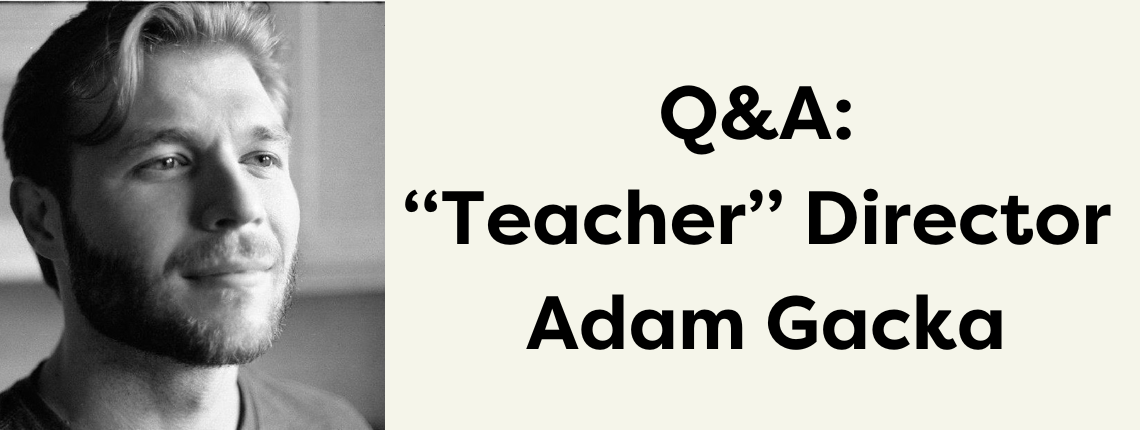One of the biggest challenges facing America’s education system is a shortage of teachers. A lack of educators increases classroom sizes, places additional stress on remaining teachers, and threatens students’ right to a high-quality education.
Annually, 8% of teachers leave the profession, but an increase in workloads and aftereffects from the COVID-19 pandemic have put even more pressure on educators. An AdoptAClassroom.org survey found that 13% of teachers were considering leaving their jobs.
“Teacher” is a powerful documentary film following first-year teacher Nkanga, a member of the Chicago Teacher Residency program. Through the lens of Nkanga’s story, the film examines the root causes of the nation’s daunting teacher shortage and the dedication of America’s educators.
Film Director Adam Gacka sat down with AdoptAClassroom.org to talk about what he learned while making the film.
AdoptAClassroom.org (AAC): What is your film about?
Adam Gacka (AG): The film follows a mentor and resident teacher at Curtis Elementary, which is on the south side of Chicago, during the 2021 to 2022 school year. What I tried to do is provide an inside look at what it’s like in the classroom for teachers, specifically in an underserved community, and explore some of the root causes of the teacher shortage.
AAC: The film highlights how hard teachers work not just to support learning, but also to build meaningful relationships with their students and school community. Why was it important for you to show that side of teaching?
AG: I think it’s at the core of what it means to be a teacher. I think for you to be an effective teacher, you have to have an emotional connection with your students to understand what they’re going through, how they learn, when might be a good time to step back when they need additional assistance. Teaching is just a monumental task. You must suppress your own emotions, stress, and sicknesses, and still show up every day.
AAC: The film explores the causes and impact of teacher turnover. This is a significant issue for all school communities. What did you learn while making the film about the impact on students when their teachers leave their school or the profession?
AG: I think consistency is important. If students are seeing turnover year over year, it shows them that the teachers, whether it’s true or not, don’t care. I think that impacts their self-confidence, their self-worth, and their outlook on the value of education.
AAC: The Chicago Teacher Residency is highlighted in the film as one program designed to train impactful new teachers and keep them in the profession. Their program has a strong focus on student-centered schools and teacher mentorship. Why do you think they are finding success?
AG: We do teachers a disservice when we drop them into the classroom and they’re not prepared. That is part of what leads to them exiting the profession early because they just weren’t prepared. This program is designed to help prepare teachers for the real challenges they’re going to face.
AAC: Why do you think that education is so crucial for our future?
AG: Education is the foundation that any society is built on. Democracy only works if citizens are informed. You also go to school to learn how to interact with one another. An educated society is healthier, wealthier, and less likely to hate. It should be the number one priority for us moving forward because there are so many challenges that we’re facing. We can only tackle them if we’re informed, and we know how to work well with others.
AAC: What do you think is keeping us from focusing on education as a solution to help society?
AG: I think the passive indifference of the public is a huge factor. Whether it is financial struggles, health struggles, mental health issues, everyone has their own battles and it’s hard to think about long term solutions when you’re fighting in the trenches every day.
AAC: What would you like viewers of the film to take with them?
AG: If we hope to change the direction that this country is headed, we need to invest in education. Teaching is probably one of the most important jobs in the world, and the respect we have for educators needs to match that.
AAC: How can the film be used as a tool to support change in support of our nation’s teachers?
AG: I’ve created screening packages that are designed for schools. My hope is that individual schools will bring this film to their community and have a discussion with parents and community leaders about the specific issues that teachers are facing in that building. Hopefully, that can be a starting point for more community involvement, advocacy, and increased respect for the profession and teachers themselves.
To learn more about “Teacher” visit https://www.teacherdocumentary.com/
